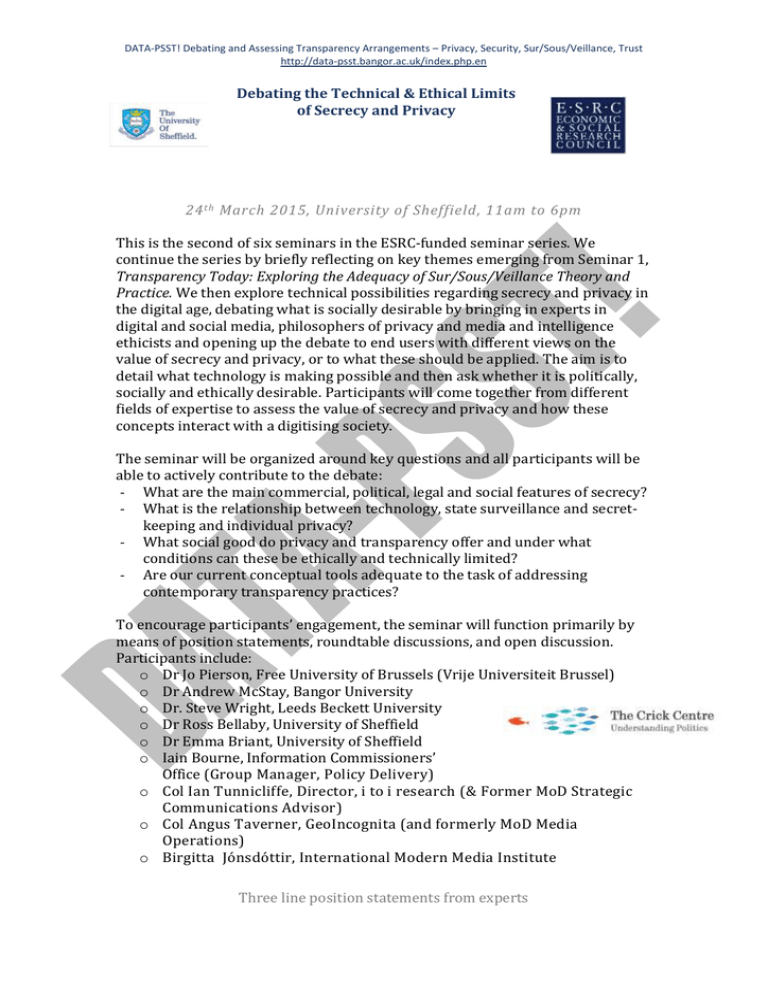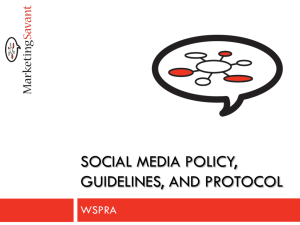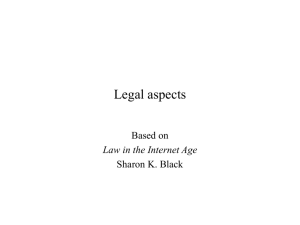DATA-PSST! Debating and Assessing Transparency Arrangements
advertisement

DATA-PSST! Debating and Assessing Transparency Arrangements – Privacy, Security, Sur/Sous/Veillance, Trust http://data-psst.bangor.ac.uk/index.php.en Debating the Technical & Ethical Limits of Secrecy and Privacy 24 th March 2015, University of Sheffield, 11am to 6pm This is the second of six seminars in the ESRC-funded seminar series. We continue the series by briefly reflecting on key themes emerging from Seminar 1, Transparency Today: Exploring the Adequacy of Sur/Sous/Veillance Theory and Practice. We then explore technical possibilities regarding secrecy and privacy in the digital age, debating what is socially desirable by bringing in experts in digital and social media, philosophers of privacy and media and intelligence ethicists and opening up the debate to end users with different views on the value of secrecy and privacy, or to what these should be applied. The aim is to detail what technology is making possible and then ask whether it is politically, socially and ethically desirable. Participants will come together from different fields of expertise to assess the value of secrecy and privacy and how these concepts interact with a digitising society. The seminar will be organized around key questions and all participants will be able to actively contribute to the debate: - What are the main commercial, political, legal and social features of secrecy? - What is the relationship between technology, state surveillance and secretkeeping and individual privacy? - What social good do privacy and transparency offer and under what conditions can these be ethically and technically limited? - Are our current conceptual tools adequate to the task of addressing contemporary transparency practices? To encourage participants’ engagement, the seminar will function primarily by means of position statements, roundtable discussions, and open discussion. Participants include: o Dr Jo Pierson, Free University of Brussels (Vrije Universiteit Brussel) o Dr Andrew McStay, Bangor University o Dr. Steve Wright, Leeds Beckett University o Dr Ross Bellaby, University of Sheffield o Dr Emma Briant, University of Sheffield o Iain Bourne, Information Commissioners’ Office (Group Manager, Policy Delivery) o Col Ian Tunnicliffe, Director, i to i research (& Former MoD Strategic Communications Advisor) o Col Angus Taverner, GeoIncognita (and formerly MoD Media Operations) o Birgitta Jónsdóttir, International Modern Media Institute Three line position statements from experts DATA-PSST! Debating and Assessing Transparency Arrangements – Privacy, Security, Sur/Sous/Veillance, Trust http://data-psst.bangor.ac.uk/index.php.en Dr. Jo Pierson In order to enhance empowerment and mitigate disempowerment of citizens/consumers in a culture of connectivity and datafication, we need to understand and interfere with the socio-technical design and use of media technologies. Iain Bourne How do we deploy technology to deliver new services whilst ensuring consumers are empowered? What degree of choice and control do people want and how do they exercise this? How do we reconcile the permanence and availability of personal information online with ‘traditional’ privacy rights? Ian Tunnicliffe ‘Through a glass darkly’ - between the intelligence world and the public world there has emerged a clear difference in perspectives, but this is now a difference that has been dramatically worsened by the media, popular entertainment and culture. Dr. Steve Wright Can adequate democratic frameworks of accountability be set against an authoritarian clamour for ever more surveillance tools and an accelerating erosion of hard-won constitutional privacy laws against warrantless wiretapping? Dr. Andrew McStay Privacy is best clarified by first thinking of it outside of technological, technical and surveillance terms. On understanding privacy as a basic principle of interaction between people, we can see it as an affective protocol. Once recognised as agreed protocol that orients and guides dealings with others, we can apply this to technical objects, legislation and decision-making on informational privacy. Dr. Emma Briant Where technologies of secrecy and surveillance are developing faster than research, policy and legal frameworks respond, how do we ensure the rights of citizens, and the work of journalists and researchers, are protected and not surrendered by default to more immediate concerns? DATA-PSST! Debating and Assessing Transparency Arrangements – Privacy, Security, Sur/Sous/Veillance, Trust http://data-psst.bangor.ac.uk/index.php.en Dr. Ross W Bellaby Intelligence is an inherently secretive affair. However, this secrecy comes into conflict with our democratic principles of transparency and accountability. So, how secretive should the intelligence community be? Where should the balance be set? And should we condemn or praise whistle-blowers? Dr. Adi Kuntsman We are living in times when privacy and secrecy are, paradoxically, both increasingly guarded and increasingly unstable. Our daily routines include entering multiple password and constant adjustment of privacy settings; and yet the dominating practice of social networking today is that of perpetual sharing. Our virtual and material environments are filled with technologies of protection; our governments adopt new defenses in light of Wikileaks or the Snowden affair, knowing that more similar exposures are likely to come. And yet, the everyday fabric of social media culture is that of constant exposures: embarrassing personal information, incriminating or incident photographs, or even stories of abuse and cruelty, shared willingly and joyfully on YouTube, Instagram, Facebook of Twitter. So while big concerns over individual privacy and national secrecy are steadily taking over the agenda of researchers, journalists, intelligence leaders and software developers, what is often left in the shadows are questions of mundane digital sociality, its ordinary routines and their, at times unexpected, political effects. Whose privacy are we talking about there, and whose secrecy? To whom, in other words, are we accountable, when we praise -- or condemn -- digital exposures, or when we protect -- or disregard -digital privacy? For example, when social media becomes an archive of willing self-recorded perpetration (soldiers documenting their own abuse of civilian populations, or beautifying acts of war through Instagram filers); or when social media scandals simultaneously expose and excuse the “public secrecy” (Taussig, 1999) of racial or colonial violence. In my talk I will attend to the conceptual, ethical and political complexities of studying privacy and secrecy in social media at the intersection of big politics and ordinary violence. Dr. Clare Birchall Secrecy of the Left Secrecy and its productive possibilities have been obscured both by the fear that secrecy is always a gateway to micro-fascism and a moral attachment to disclosure. Recognizing this could open up a new way of understanding the political and moral alignments of concealment and disclosure. Should the radical Left jump on the bandwagon of Liberal (and neoliberal) transparency as a way to instigate change, or should it experiment with a politics of the secret? When referring to a secrecy of the Left, I am thinking of different spaces, subjectivities and relations opened up by critical theories of, and aesthetic DATA-PSST! Debating and Assessing Transparency Arrangements – Privacy, Security, Sur/Sous/Veillance, Trust http://data-psst.bangor.ac.uk/index.php.en experiments with secrecy. For instance, Jacques Derrida has a ‘taste for the secret’ (2001), but not the common, contextual secret that hides somewhere waiting to be revealed. He is interested, rather, in the unconditional secret: ‘an experience that does not make itself available to information’ (1992: 201). Eschewing the hermeneutic drive and circumventing attempts to anticipate revelation, the unconditional secret within a text should be thought of as an encounter with the Other through which a responsibility of reading is made possible (and impossible). The secret, here, is fashioned in a productive capacity, in the service of ethics. In terms of democracy, Derrida defends the secret qua singularity, seeing it as an alternative to ‘the demand that everything be paraded in the public square’ (2001: 59). ‘If a right to the secret is not maintained,’ he writes, ‘we are in a totalitarian space’ (2001: 59). In light of such a formulation, we should be concerned for those who do not want to adhere to the dominant doctrines of democracy, including the doctrine of transparency. The subject of democracy is not simply one who is asked to be transparent to the state and act on transparency but also, in the guise of Derrida’s non self-present subject, one that is constituted by a singularity that prevents full capitulation to the demands of transparency. For further inspiration, we can draw on the politico-aesthetic imagination of two collectives that span both ends of the twentieth century: Acéphale (1936-9) and Tiqqun (1999-2001). Georges Bataille wanted to ‘use secrecy as a weapon rather than a retreat’ (Lütticken, 2006: 32) and imagined how a secret society named Acéphale (which translates as ‘Headless’) could regenerate or revolutionise society at large by instigating the kind of unorthodox values he championed throughout his oeuvre including expenditure, risk, and loss. In their ‘Cybernetic Hypothesis’, the collective, Tiqqun, who were highly influenced by Bataille among others, call for ‘interference’, haze’ or ‘fog’ as the ‘prime vector of revolt’ (2001/9). They see opacity as a means to challenge the political project of cybernetics and ‘the tyranny of transparency which control imposes’ (2001/9). We can also look to certain technological practices that question the promise and probe the political economy of openness. Take, for example, Freedom Box and TOR, which both, in different ways, try to facilitate secure networks and online anonymity; TrackMeNot, a browser extension that aims to derail surveillance and data-profiling by flooding engines with random search terms; the (now defunct) Web 2.0 Suicide Machine that scrambled one’s online identity by erasing individual data and friendship links on social media sites; or the decentralised hacktivist culture that connects under the title Anonymous. While such theories of, and experiments with secrecy won’t alone be enough, they might offer a ‘space’ in which a form of visibility that works for rather than against social justice might be imagined. Experiments with both secrecy and transparency, with existence through the play of optics, might just offer the conditions under which politics can be rethought. Dr. Helen Kennedy DATA-PSST! Debating and Assessing Transparency Arrangements – Privacy, Security, Sur/Sous/Veillance, Trust http://data-psst.bangor.ac.uk/index.php.en What do ‘ordinary’ internet users think about privacy, security, surveillance, trust in relation to their data, and how should we account for their views when we discuss these topics? How do we engage ordinary internet users, and people doing what might be considered ‘ordinary’ data mining (such as a museum interested in visitors’ responses to an exhibition, a local council wanting to know what people think about cost efficiency measures) in debates about the ethics of data mining? Do we need to differentiate the types of data practices which we would want to subject to transparency or other regulatory measures? How do we contrast transparency with accountability and argue that the latter is more important? Craig Hamilton My PhD research project concerns popular music consumption in the digital age. The collection, use, availability and ownership of data generated by and about music listeners is an important concern of my project, particularly since the music industries are increasingly harnessing the potential of data to inform decisions about all aspects of their production, distribution and consumption processes.





